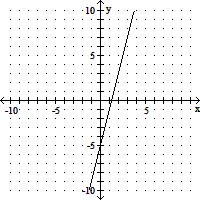Find the integral.
A.  + C
+ C
B. e ln(ex + e) + C
C. x + C
D. ln(ex + e) + C
Answer: D
You might also like to view...
Solve the problem.A ball is thrown downward from a window in a tall building. Its position at time t in seconds is  where s is in feet. How long (to the nearest tenth) will it take the ball to fall 227 feet?
where s is in feet. How long (to the nearest tenth) will it take the ball to fall 227 feet?
A. 3.8 sec B. 2.7 sec C. 8.4 sec D. 2.9 sec
Find the slope and the y-intercept from the equation of the line. Sketch a graph of the equation.y = 4x - 5
A. m = 5, y-intercept = 4
B. m = 4, y-intercept = 5
C. m = 4, y-intercept = - 5
D. m = 5, y-intercept = 4
Write an equation for the linear function f satisfying the given conditions.f(-1) = -5 and f(5) = 7
A. f(x) = 3x - 8 B. f(x) = -3x - 8 C. f(x) = 4x - 1 D. f(x) = 2x - 3
Due to the curvature of the earth, the maximum distance D that you can see from the top of a tall building of height h is estimated by the formula  figure 1.png) where r = 3960 mi is the radius of the earth and D and h are also measured in miles. How far can you see from the observation deck of a tower, 955 ft above the ground? Round the answer to one decimal place.
where r = 3960 mi is the radius of the earth and D and h are also measured in miles. How far can you see from the observation deck of a tower, 955 ft above the ground? Round the answer to one decimal place.
What will be an ideal response?